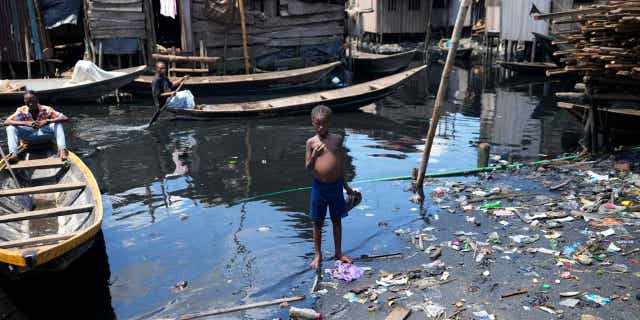In the bustling Nigerian city of Lagos, children from the Makoko area swim and play in dirty water surrounded by rubbish.
In the largest city of the Ivory Coast, Abidjan, thousands of families have to draw water from streams for their daily needs.
In Mozambique and Malawi the recent destruction and flooding caused by Cyclone Freddy has displaced more than 500,000 people and the lack of clean water has seen a dramatic increase in cholera cases.
March 22 is the United Nations World Water Day, celebrated annually since 1993 to raise awareness of the urgent need for billions of people around the world to have access to clean water and sanitation.
According to the United Nations, 1 in 4 people – 2 billion people worldwide – lack safe drinking water and 1.4 million people die each year from diseases related to lack of water, sanitation and hygiene.
DAILY HUNTING FOR WATER AFFECTS MILLIONS OF AFRICANS
Some 190 million children in 10 African countries are at the highest risk due to inadequate access to clean water and sanitation, according to a new analysis by UNICEF, the United Nations Children’s Fund. expose to hygiene-related diseases.
An increase in extreme weather caused by climate change has added to the dangers, the report said.

A child stands in dirty water surrounded by rubbish in Nigeria’s economic capital Lagos in March. 20, 2023. March 22 is World Water Day, established by the United Nations and celebrated annually since 1993 to raise awareness of access to clean water and sanitation. Many children in Africa lack access to clean drinking water. (AP Photo/Sunday Alamba)
In Abidjan, a port city in the Ivory Coast and a rapidly growing economic centre, many communities find themselves without drinking water. Women collect water from streams to meet household needs.
Water can leak from home faucets late at night if they’re lucky, and homes are filled with plastic containers and buckets to catch it when it does.
AFRICAN GOVERNMENTS URGED TO SPEND MORE ON WATER SECURITY
Local officials in Côte d’Ivoire blame a shortage of electricity to their pumps in part for the problems here. Transporting and selling water for about 15 cents a 5-gallon container is a lucrative business for some.
One of the world’s Sustainable Development Goals is for everyone to have clean water and sanitation by 2030.
A report launched on the eve of the first major UN water conference in over 45 years says 26% of the world’s population lacks access to clean water and 46% lacks access to basic sanitation.
The United Nations World Water Development Report 2023, released this week, paints a stark picture of the huge gap that needs to be closed to meet the United Nations goals to ensure all people have access to clean water and services sanitation by 2030.
CLICK HERE TO GET THE FOX NEWS APP
The estimated cost of meeting the goals is between $600 billion and $1 trillion annually, according to Richard Connor, the report’s editor-in-chief.
Investors, governments and climate change communities need to form partnerships to ensure that money is invested in supporting the environment and providing clean water for the 2 billion people who lack it, he said. stated Connor.
